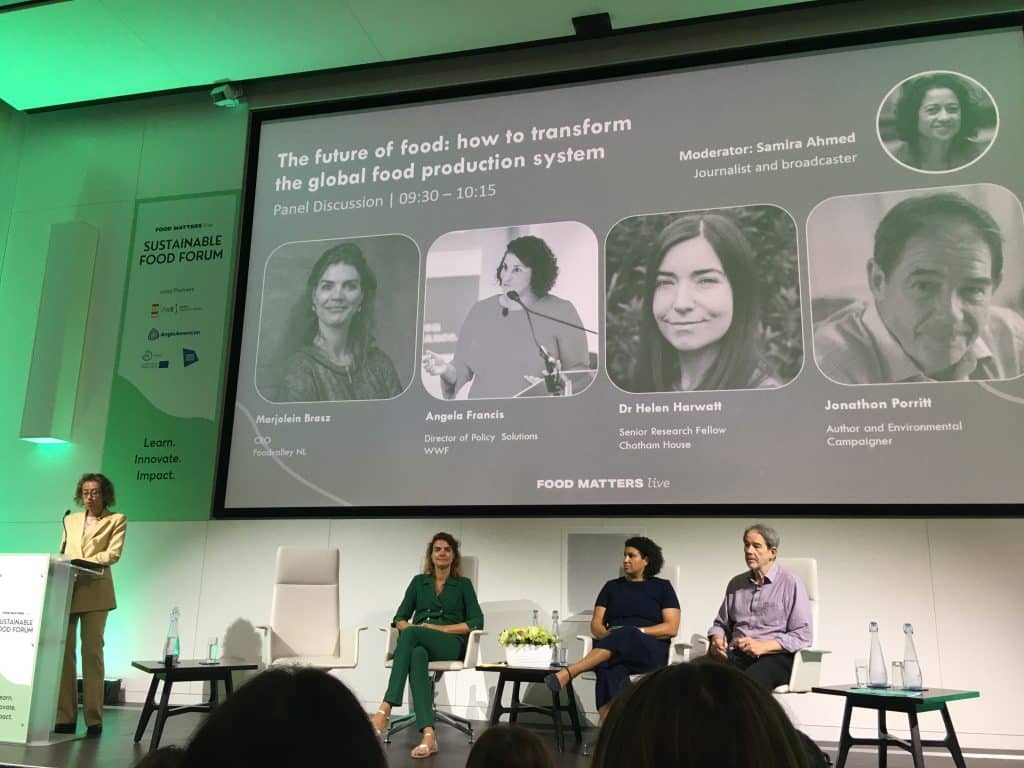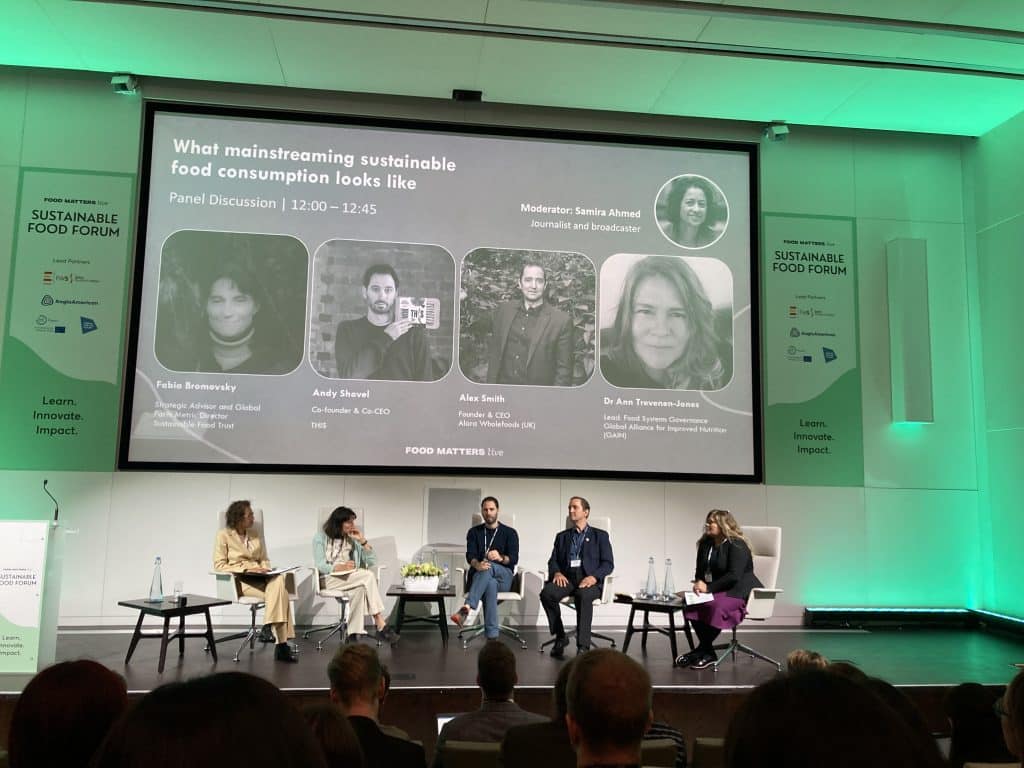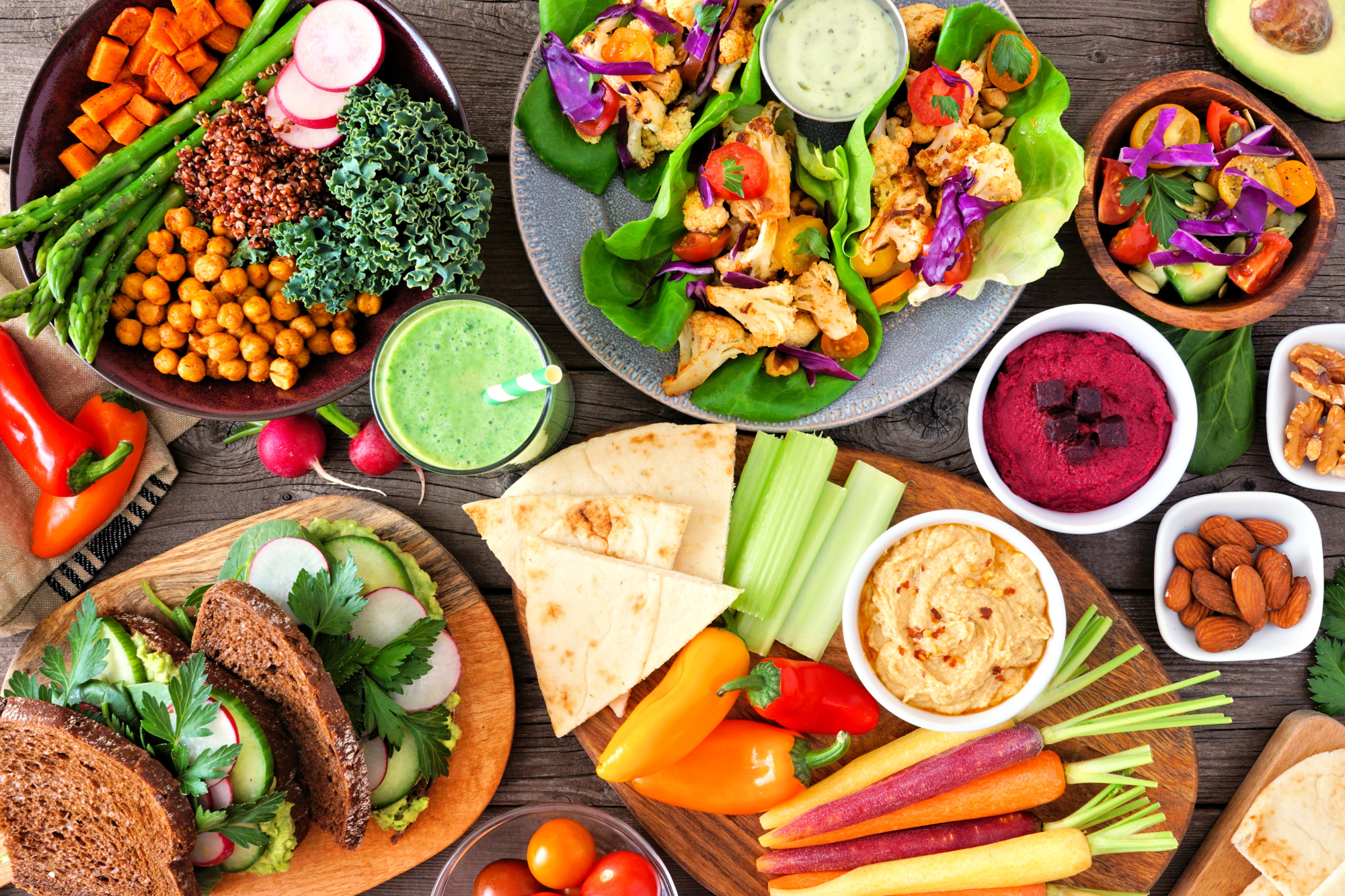By Gemma Tadman, Business Communications Manager, ProVeg International
Empowering the food industry towards sustainable transformation
At the end of September, the New Food Hub was invited to attend the annual Sustainable Food Forum in the UK. Hosted in a magnificent Grade II listed building in London’s Euston Square, the two-day summit brought together food industry luminaries focussed on shifting our global food system to one that is more balanced, secure, and sustainable.
The two days were packed with presentations, panel discussions, and intimate roundtables – each session gave me new knowledge and food industry insights to chew on.
If you were unable to attend the Sustainable Food Forum yourself, here are my key takeaways and learnings, with some implementable insights.
1. The energy transition needs to be replicated in the food system
The Sustainable Food Forum opened with a presentation focusing on ‘The Future of Food: How To Transform The Global Food Production System’ – by no means a small task!
Yet, there is hope in the fact that there is already one such sustainable transition taking place: energy. If we think back 10 or so years ago, the transition to greener, cleaner, renewable energy was nowhere to be seen on the worldwide agenda, and while it still has a way to go (and is not without its own problems), it’s now firmly in the minds of politicians, businesses, and consumers globally.
“We are entering a new phase of change,” opened Marjolein Brasz, CEO, FoodValley. “We have been working on the energy transition for a decade now – there was difficulty originally getting the energy transition on the agenda, but now it’s become more mainstream – the food transition is in its slipstream, but it’s part of a necessary change.”
So, how do we bring attention to the need for food system change, and ensure the issue is taken as seriously as the energy transition?
With help from all those involved in, and influencing, the food system – from governments, NGOs, and farmers to brands, retailers, and consumers.
Luckily, many consumers are already keen to support a more efficient and climate-friendly food system. “In the Netherlands,” started Brasz, “the public is worried about the speed of climate change – people chained themselves to the freeway! But the government is not taking enough steps.”
Angela Francis, Chief Advisor of Economics and Economic Development to WWF, agreed that we need to see change. She believes that “the energy system transition needs to be replicated in the food system.” But as she eloquently stated, “What are the ‘fossil fuels’ we are trying to get rid of?” Indeed, before we can make truly sustainable changes in the food system, this needs to be agreed upon unilaterally.

Just like fossil fuels, animal agriculture harms our environment in several ways, including through greenhouse gas emissions, air and water pollution, habitat destruction, and biodiversity loss.
At ProVeg, we’re working to replace 50% of animal-based foods with plant-based, cultivated and fermentation-enabled options by 2040, and thus, would put forth ‘animal products’ as the ‘fossil fuels’ of the food industry.
Dr Helen Harwatt, Senior Research Fellow at Chatham House, echoed this sentiment. “A lot of improvements are required – we must reduce the need for animal agriculture. Production must be scaled back by 70% to align with reducing global temperature rises. We also need to do removals of CO2 from the atmosphere, reforest large areas of land, restore agricultural land with native land cover, and help restore biodiverse ecosystems. But more action is needed to reduce the production and consumption of animal-produced foods.”
Harwitt added: “Policy action is needed from wealthy countries – we must prioritise reducing domestic activities. The key things that policy across all different levels can do is peak production and purchase of animal products, this will send a ripple effect through the food system, allowing markets to prepare for a shift away.”
Certainly, we need more collaboration and action from all food industry players. Food brands, producers, and food service will have a key part to play throughout, along with government bodies.
2. We need subsidy reforms
Policy reform – with a focus on subsidies – was a strong point made by many of the presenters.
In the opening talk, Jonathan Porrit, environmental campaigner and author stated that: “Sustainable foods get a tiny fraction of the subsidy system. Animal agriculture gets a trillion dollars every year – but no more than 3% of that goes towards sustainable, environmentally-friendly alternatives.”
Porrit continued: “Into that trough, big agricultural companies want to keep dipping; they will fight to defend their subsidies; it’s a crutch. Systematically, they have hacked people’s appetites.”
Essentially, these subsidies make it possible to maintain the ‘status quo’ in the food system. If more of these subsidies were fed into the alternative protein industry, it would support things like cost reduction of alternative protein products; research and development of the sector, market expansion, and encourage more farmers to grow arable crops for plant-based products.
Dr Harwitt added that we are seeing small but impactful political shifts: “Look at climate change COPs for example; we are starting to see more of a food system presence there.”
Hopefully, at COP28, sustainably produced plant-based, fermented, and cultured foods will secure the attention required to see real subsidy reforms the world-over.
3. ‘Taste’ is key to sustainable eating
During a talk on consumers, I learned that more than half of European consumers polled by Ipsos consider the climate impact important when purchasing food and beverages.
But despite the growing number of options and brands, consumers still struggle to maintain more sustainable eating habits. So how can brands and retailers support consumers in their conscious eating goals? What matters to consumers even more than the climate, when food is on the table?
When it comes to keeping up sustainable eating habits, like choosing more plant-based options, taste is king, as I heard in the session: ‘Bringing conscious eating into homes one bite at a time.’
“Taste always comes first with consumers,” explained Emily Giles, Head of UK Sales at La Vie. “It’s not about gimmicks. Brands that focus on taste – not health and other factors – will win.”
In other words, no matter how eco-friendly or health-conscious a product may be, if it doesn’t deliver on the taste front, it is less likely to win consumer loyalty. Brands that recognise this principle and focus on creating flavourful, satisfying experiences are in a prime position to succeed in the alt-protein market.

Callum Braddock, Tindle Foods, Business Development Director, seconded Giles’ thinking. He explained that Tindle took a unique development approach that helped them focus on taste.
“Our approach is working and listening to chefs in a culinary environment,” Braddock said. “We started in food service only. We wanted to prove and test (our products) in a consumer environment and get accepted by consumers first, and not have our products seen as an ‘alternative’ but as a delicious eating experience in their own right.”
“With Tindle,” he continued, “we focussed on the chicken thigh meat and the darker meat – which has more flavour, fat, taste, texture, and a more sensory experience. Previous chicken alternatives are not good enough to eat, in my opinion. We wanted to focus on product quality, aim at meat eaters, and make it easy, with no question about ‘what’ it is – just, does it ‘eat’ well?!”
Emily Giles of La Vie also shed light on an interesting phenomenon in the alt-protein industry: the “halo effect.” While taste is paramount, consumers appreciate brands that offer great taste and good nutrition. This dual approach can create a positive “halo” around a brand, which results in increased consumer trust and loyalty.
Brands that balance taste and nutritional value effectively can position themselves as champions of conscious eating. Such brands not only satisfy taste buds but also contribute to consumers’ overall wellbeing. This holistic approach is especially relevant in the alt-protein market, where consumers often seek products that are not only environmentally-friendly but also align with their health goals.
4. The plant-based industry is going through a ‘natural evolution’
Many news outlets are focussing on the ‘slow-down’ of plant-based sales currently, but according to many experts I heard from at the Sustainable Food Forum, these reports might be misdirected.
“There are a lot of negative narratives circulating in the plant-based space at the moment,” said Emily Giles of La Vie, “but the category is just going through a ‘natural evolution. A plethora of NPD plant-based ‘cream’ will rise to the top, and sadly, the ‘less good’ brands and products will drop out to the bottom. When that happens, we will see the category bounce back to growth – and these brands will be at the forefront as the industry focuses on growth.”
Inasmuch, it’s entirely normal for a young industry to experience a ‘slow-down’ in sales; not all brands will survive – that’s just business.
Callum Braddock of Tindle seconded that opinion: “The market has become saturated with new brands and companies coming into the space, so much so, that now people are questioning a ‘slow down’!”

Braddock also highlighted a critical point that food companies entering the plant-based arena must consider: innovation is the key to long-term success. In a market flooded with options, being distinct and offering something that consumers want is crucial for gaining a competitive edge.
So, what does it take to thrive in this evolving landscape?
“Don’t give a duplication of what’s already been there,” explained Braddock, “There are 82 plant-based sausages in the UK market… How do you compete with that? We’ve diluted the market too much with too many similar products, so we need to bring consumers something new!”
Certainly, if you’re just adding another product to the existing pile, you’re less likely to capture the attention of discerning consumers.
“Rather than just another burger,” said Braddock, “assess the marketplace and consumer desires, rather than give new, similar products. Don’t dilute the market.”
To foster innovation and succeed, companies should look beyond the obvious choices. Embrace new ingredients, flavours, and product categories. Ultimately, ensure that you are offering consumers an experience they truly want or need, not one they already have – look to the many industry white spaces that are yet to be filled!
Key lessons
The recent Sustainable Food Forum provided a wealth of insights and actionable takeaways for F&B players invested in the sustainability of our global food system. Here are the key lessons to implement on your own sustainability journey:
1. Harness consumer concern: Consumer interest in supporting sustainable food initiatives is on the rise due to concerns about climate change and environmental degradation. Leverage this concern to promote and develop more sustainable food options.
2. Collaborate across stakeholders: Engage governments, NGOs, farmers, brands, retailers, and consumers to elevate the importance of transforming the food system. A unified approach is crucial for meaningful change.
3. Scale back animal-based products: Consider animal-based products as the ‘fossil fuels’ of the food industry. Prioritise the development of sustainable, plant-based, cultured, and fermentation-enabled alternatives to reduce the environmental impact of animal agriculture.
4. Raise awareness and educate consumers: Consumer education plays a pivotal role in promoting sustainable food choices. Food brands, producers, and restaurants should emphasise the positive environmental benefits of plant-based, cultured, and fermentation-enabled foods.
5. Advocate for subsidy reforms: Lobby for policy reforms that redirect subsidies towards the alternative food industry, supporting cost reduction, research, market expansion, and arable crop farming.
6. Prioritise taste and nutrition: While sustainability is vital, consumers prioritise taste above all. Ensure that your plant-based products offer exceptional taste, matching or surpassing traditional animal-based options, and keep nutrition in mind.
7. Embrace innovation: In a saturated market, innovation is key to long-term success. Analyse consumer desires in the food service and retail landscape. Avoid duplicating existing products and identify white spaces to fill with new, distinctive offerings.
By implementing these insights, you can contribute to the ongoing transformation of the food industry towards greater sustainability, balancing the needs of the planet and the preferences of consumers.



